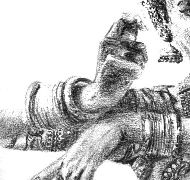- Project Proposal
Aarathi Prasad
aarathi@cs.dartmouth.edu

| Look who's dancing!! - Project Proposal Aarathi Prasad aarathi@cs.dartmouth.edu |
 |
This is a classification problem and will require a supervised learning algorithm, like support vector machines(SVM). It is not a binary classification,
since the goal is not to determine whether the activity captured involves dance movements or not. In this particular problem, we need to treat each
subject separately. Suppose we have 5 dancers(subjects); they will be assigned a class label from the set C = {0,1,2,3,4}. The training data will be grouped using these
class labels and the learning algorithm will then classify the testing data, based on the previously labeled training items. Since the procedure involves
multiple classes, it would be better to use a multiclass SVM training algorithm for building a model to group the testing data. If the data is too
complex for a hyperplane to separate it, kernel tricks might have to be incorporated as well.